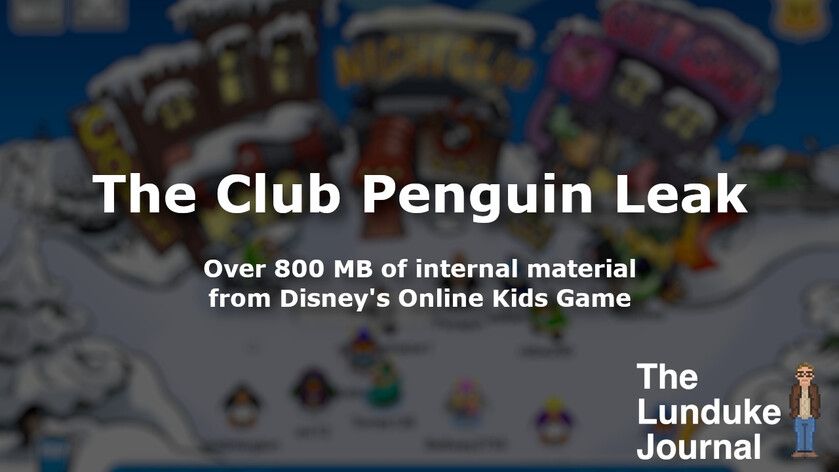Yesterday, I was made aware of a leaked archive of internal documents from within Disney -- specifically focusing on Club Penguin (the extremely popular, online children's game which ran from 2005 through 2017).
This leak -- consisting of over 800 MB of PDFs and archived, internal documentation webpages -- was posted anonymously to 4chan. So, naturally, I fired up a virtual machine (better safe than sorry when dealing with files from unknown sources) and downloaded every byte.
The Club Penguin Leak is Real
The first thing that needed to be ascertained was the validity of the files within this leak. Were these files truly from within Disney (and the Club Penguin team)?
And the answer is, with a high level of certainty, yes. This leak is legitimate.
How do I know this leaked material truly came from within Disney?
Because I used to work at Disney. Specifically... on Club Penguin. In fact, I still have my Disney "Cast Member" badge (because having a badge that says "Disney Cast Member" is just too cool to not keep).
While the contents of this particular leak primarily cover the time between 2014 and 2017, which was after my time working on Club Penguin, I know enough details to be able to confidently verify this material.
With that important step out of the way, let's dive into the contents of the leak.
Nothing Overly Surprising or Controversial
I know what all of you are wondering.
"Is there anything controversial or juicy in these leaks? It's Disney! It's a popular kids online game! There's gotta be something wild in here!"
But, you know what? It's really pretty dull. Lots and lots of corporate boringness.
The only times anything got even remotely political were during two "End of Sprint" retrospective meetings (Club Penguin development used an "Agile" development methodology, with work divided into multi-week "Sprints").
The first time was immediately following the November, 2016 USA election.
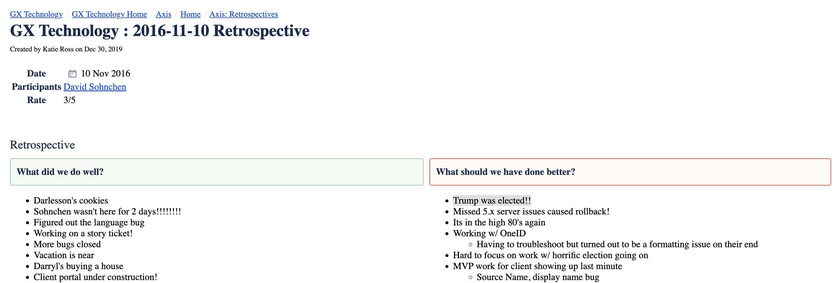
"What should we have done better?"
The answer? "Trump was elected!!"
Clearly the team was not thrilled that Trump won that election.
Though, all was not lost! The team was very pleased with "Darlesson's cookies" and happy that Darryl was buying a house. So. You know. Now we all know those details. From within Disney. Back in 2016.
Flash forward to January of 2017, and we have a similar set of statements from another "End of Sprint Retrospective".
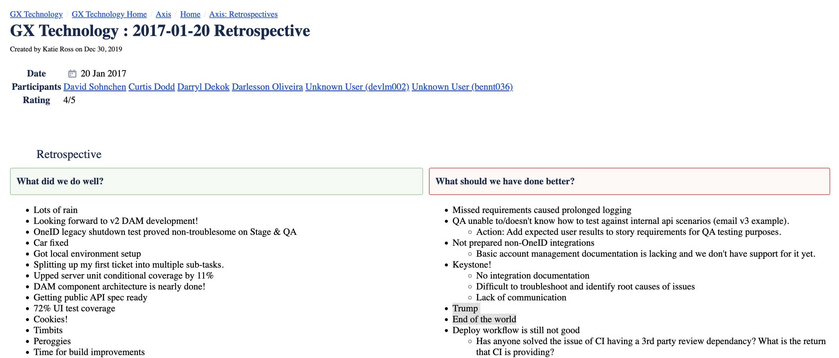
This, of course, happened after President Trump was sworn in to office.
Once again, the Disney Club Penguin team asked themselves, "What should we have done better?"
The answers? "Trump" and "End of the world".
But, hey! Look at all those things they did well! Cookies! Perogies! Oooh! And Timbits (aka "Donut holes")! Looks like they were eating well!
Thus ends the entirety of the political content found within these Club Penguin leaks. Over 800 MB of leaks -- consisting of 137 PDF files and an absolutely massive number of HTML files -- and this is the most politically charged content in the entire archive.
Keeping Club Penguin Clean
One of the difficult challenges in running an online system -- like Club Penguin -- for children... is keeping things... clean. Family friendly. G Rated.
No matter how much work went into limiting "adult" content, people would find ways to sneak naughty stuff into the game world. More often than not through the use of funky acronyms. Sometimes it would be older kids just being naughty... other times it was adults "playing Club Penguin" and being gross.
Within this leak is a "Top 50 Acronyms Parents need to know" -- which contained a small portion of the known ones. Some were pretty wild.
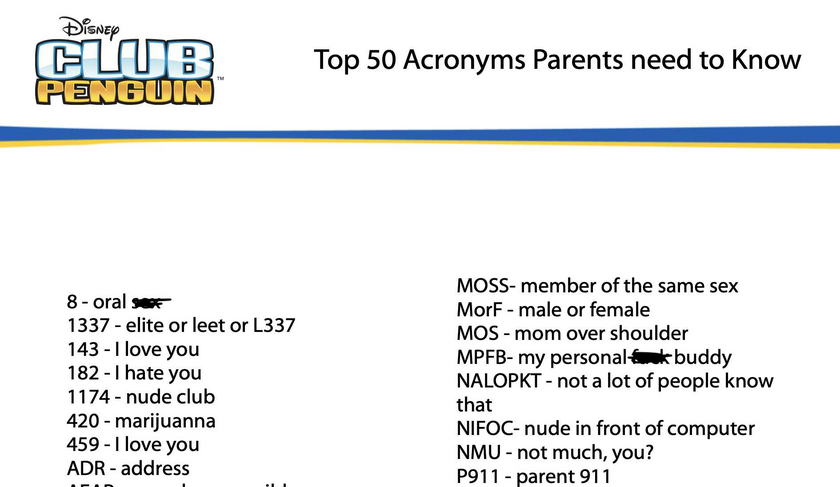
To Club Penguin's credit, they worked pretty hard to limit all of this as best they could.
True story: When I was working on Club Penguin, an issue needed to be handled where players would work together to arrange their penguin characters (by simply walking around the world) into inappropriate patterns. I'm not going to describe those patterns... I'm sure you can use your imagination to figure out the pictures they were trying to make. The solution was to create a function that checked for the penguins being in certain types of particularly naughty patterns... and, when detected, shuffle the characters all over the screen. It wasn't a great fix. But it did the job.
This Leak Gave Me Corporate PTSD
End of Sprint Retrospectives. Sprint Planning Documents. Burndown charts. Reports and proposals.
As I read through page after page of corporate, agile busy work I felt myself becoming increasingly stressed. And annoyed. Flashbacks to morning Standups and Scrum meetings.
I was instantly back there. In the Disney Club Penguin office. In that meeting room. Under those fluorescent lights. Feeling my soul slowly dying as I await my turn to give my daily update.
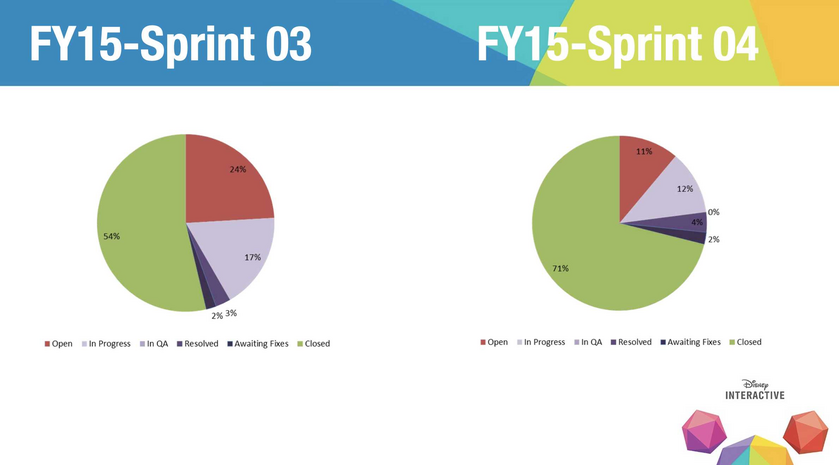
While there's nothing damning or incriminating in these leaks... it served as a visceral reminder of why I stopped working for Disney.
Here's another screenshot. This one is a Burn-up Chart pulling data from JIRA (a bug/task tracking system... if you don't know what it is... count yourself lucky).
I had to look at it. Now you do too.
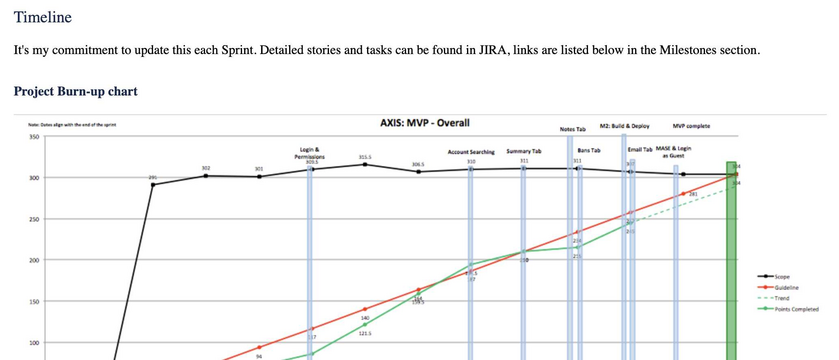
You're welcome. (I'll spare you from seeing screenshots of the countless other charts and Sprint meeting notes.)
One of the few mildly interesting tidbits in this leak comes in the form of emails, mostly between Product Managers, regarding the final days of Club Penguin -- and when they announced that the service would be closing.

And, when I say "mildly" interesting... even that is a bit of a stretch. This is all about as run-of-the-mill as it gets within the Tech Industry.
Some API Documentation
Ready to really make your eyes glaze over?
How about over One Thousand HTML files... all documenting various APIs used by a variety of systems... many of which are no longer in use. By anyone. Anywhere.
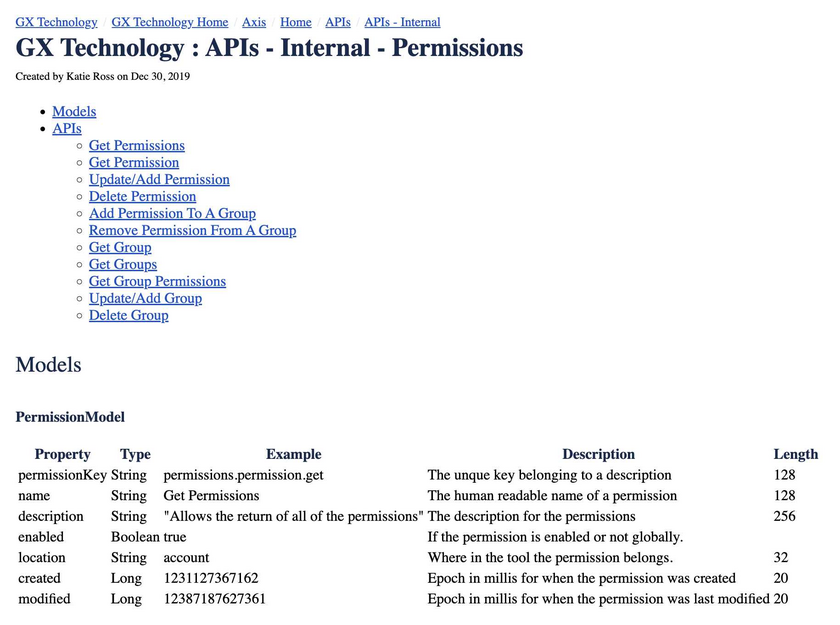
Seriously. This Disney leak includes over 1,000 files just like this one. And the vast majority of the information contained within it is only of historical interest.
But, hey. Documenting computer history is important. Even if it is mostly internal, corporate systems.
That's it. That's the Club Penguin Leak.
Right about now you're wondering to yourself, "Why do I need to know about any of this?"
Quite frankly... you don't. The truth is -- despite the massive number of documents in this particular leak -- almost none of it was going to be interesting or important to you. Heck. Let's be honest, most of it was barely interesting to the people who originally wrote these documents.
But this gives you a little glimpse into some of the work that The Lunduke Journal does.
So far this year, The Lunduke Journal has received of over 27 GB of leaked material (not including video) from a number of the biggest companies on Earth. And, while some of it is explosive and critically important (such as the Red Hat or Microsoft leaks), most of it is... a lot like this Club Penguin Leak:
One or two mildly interesting statements nestled between notes about food in the break room... and charts about bug tracking.
But The Lunduke Journal goes through it all... and only occasionally tortures you with the boring stuff.
(Unless, of course, you were a big Club Penguin fan. In which case: You're welcome for this fascinating and riveting dive into the internal documents from the final years of Club Penguin.)
